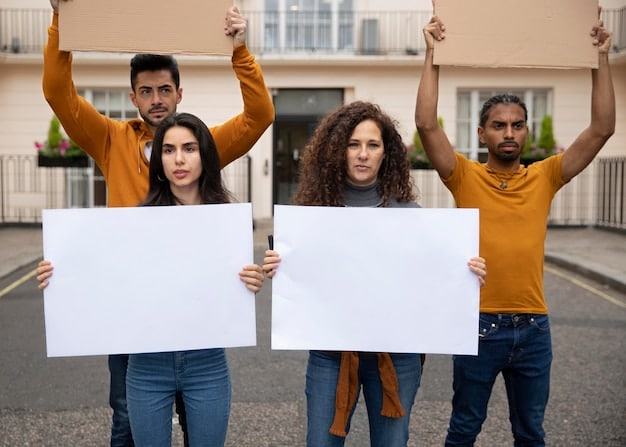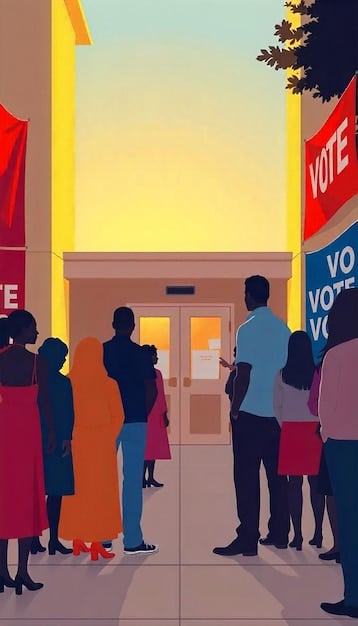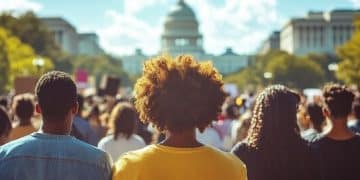The Future of Civil Rights Litigation: Emerging Legal Challenges in the US

The Future of Civil Rights Litigation: What are the Emerging Legal Challenges? involves adapting to evolving technologies, addressing systemic discrimination, and ensuring equal access to justice in a rapidly changing society in the US.
The landscape of civil rights litigation is constantly evolving, presenting new challenges and opportunities for ensuring equality and justice for all. As technology advances and societal norms shift, it’s crucial to understand The Future of Civil Rights Litigation: What are the Emerging Legal Challenges? that lawyers and advocates will face in the years to come.
Understanding the Shifting Terrain of Civil Rights Law
The field of civil rights law is dynamic. It continuously adapts to societal changes, technological advancements, and evolving legal interpretations. Understanding this shifting terrain is crucial for anticipating future challenges.
Civil rights litigation is a constantly evolving legal area, encompassing a wide variety of cases, from discrimination in employment and housing to voting rights and police misconduct. Keeping abreast with these changes is essential for both lawyers and concerned citizens.
Demographic Shifts and Civil Rights
Demographic changes in the United States are influencing the types of civil rights claims being brought before the courts. How do these shifts impact litigation?
- Increased Diversity: The US is becoming more diverse, leading to a broader range of discrimination claims based on race, ethnicity, religion, and national origin.
- Aging Population: Issues related to age discrimination in employment and access to healthcare are gaining prominence.
- LGBTQ+ Rights: Continued advocacy and litigation are shaping the legal landscape for LGBTQ+ individuals, particularly concerning marriage equality, workplace protections, and access to public services.
These shifts highlight the need for culturally competent legal strategies and a deeper understanding of intersectionality in civil rights law.
The Impact of Technology on Civil Rights Litigation
Technology has a significant impact on civil rights litigation. It presents both new tools for advocacy and new challenges regarding privacy, discrimination, and access to justice.
From social media to artificial intelligence, technology is reshaping how civil rights cases are investigated, litigated, and adjudicated. Awareness of the challenges and opportunities is essential for anyone involved in this area of law.

Data Privacy and Surveillance
How do issues related to data privacy and government surveillance impact civil rights litigation? How can lawyers navigate these complex legal and ethical considerations?
- Digital Surveillance: The increasing use of surveillance technologies raises concerns about privacy violations and potential discrimination, particularly against marginalized communities.
- Data Security: Protecting sensitive personal data is crucial, especially in cases involving health information or immigration status.
- Algorithmic Bias: Algorithmic bias in criminal justice and other areas can perpetuate discrimination and require careful legal scrutiny.
Addressing these issues requires a comprehensive understanding of data privacy laws and the potential for technology to exacerbate existing inequalities. Courts must grapple with these new realities.
Systemic Discrimination and Institutional Reform
Systemic discrimination persists in many facets of American life, from housing and education to criminal justice, requiring comprehensive legal strategies for institutional change.
Cases of systemic discrimination often involve broad challenges to policies and practices that disproportionately affect certain groups. Effective litigation requires a focus on institutional reform and policy changes.
Challenging Discriminatory Policies
How can legal strategies effectively target discriminatory policies and practices within institutions?
- Evidence-Based Litigation: Utilizing statistical data and expert testimony to demonstrate patterns of discrimination.
- Policy Advocacy: Combining litigation with advocacy efforts to promote policy reforms that address systemic issues.
- Community Engagement: Working closely with affected communities to develop legal strategies that reflect their needs and priorities.
Successfully challenging systemic discrimination requires a multi-faceted approach that combines legal expertise with community empowerment.
Voting Rights and Electoral Integrity
Protecting voting rights and ensuring electoral integrity remain critical civil rights challenges, particularly in light of recent legislative changes and ongoing legal battles.
Ensuring fair access to the ballot box is fundamental to a functioning democracy. Litigation plays a vital role in challenging discriminatory voting laws and practices.

Combating Voter Suppression
What legal strategies are most effective in combating voter suppression tactics and ensuring equal access to the ballot box for all citizens?
- Challenging Restrictive Laws: Filing lawsuits against voter ID laws, polling place closures, and other measures that disproportionately affect marginalized communities.
- Promoting Voter Education: Educating voters about their rights and how to navigate the electoral process.
- Advocating for Reform: Supporting legislative reforms that expand access to voting, such as automatic voter registration and same-day registration.
Protecting voting rights requires a comprehensive approach that combines legal advocacy with grassroots organizing efforts.
Policing and Criminal Justice Reform
Addressing issues of police misconduct, racial bias in the criminal justice system, and mass incarceration remains a central focus of civil rights litigation.
Litigation plays a critical role in holding law enforcement accountable and advocating for reforms that promote fairness and justice in the criminal justice system.
Holding Law Enforcement Accountable
How can civil rights litigation effectively hold law enforcement accountable for misconduct and promote police reform?
- Section 1983 Lawsuits: Filing lawsuits against individual officers and police departments for civil rights violations, such as excessive force and false arrest.
- Pattern or Practice Investigations: Conducting investigations into systemic patterns of police misconduct and seeking court-ordered reforms.
- Community Oversight: Promoting civilian oversight of law enforcement to increase transparency and accountability.
Achieving meaningful police reform requires continued legal advocacy and community engagement.
Access to Justice and Legal Representation
Ensuring equal access to justice for all, regardless of income or background, is a fundamental civil rights challenge requiring innovative solutions and increased funding for legal aid.
Many individuals and communities lack the resources to navigate the legal system effectively. Increasing access to legal representation is crucial for ensuring fairness and equality.
Expanding Legal Aid Services
What strategies can be used to expand access to legal aid services and ensure that everyone has the opportunity to seek justice?
- Pro Bono Programs: Encouraging attorneys to provide free legal services to low-income individuals and communities.
- Legal Clinics: Establishing legal clinics in underserved areas to provide direct legal assistance.
- Funding for Legal Aid Organizations: Increasing funding for legal aid organizations to expand their capacity to serve the community.
Expanding access to justice requires a collaborative effort involving the legal profession, policymakers, and community organizations. More pro bono services are needed.
| Key Point | Brief Description |
|---|---|
| ⚖️ Systemic Discrimination | Challenging policies that disproportionately affect certain groups. |
| 🗳️ Voting Rights | Combating voter suppression and ensuring fair access to the ballot. |
| 👮 Policing Reform | Holding law enforcement accountable for misconduct and bias. |
| 🤝 Access to Justice | Expanding legal aid services for low-income individuals. |
Frequently Asked Questions
▼
Civil rights litigation involves legal cases aimed at protecting individuals’ rights from discrimination based on characteristics such as race, gender, religion, and more. It seeks to enforce laws meant to ensure equality.
▼
Technology has introduced challenges like data privacy and algorithmic bias, but also provides new tools for advocacy. Digital evidence and surveillance technologies play growing roles in civil rights cases.
▼
Examples include discriminatory housing policies, biased employment practices, and racial profiling by law enforcement. Systemic discrimination often involves widespread, institutionalized practices rather than individual actions.
▼
Equal access to the legal system is crucial for protecting individual rights. Without it, marginalized communities cannot effectively challenge discrimination or defend their rights under the law.
▼
Lawyers play a pivotal role by representing individuals and groups who have experienced discrimination. They advocate for policy changes, file lawsuits, and work to ensure that civil rights laws are enforced.
Conclusion
The future of civil rights litigation hinges on addressing these emerging challenges effectively. As technology continues to evolve and societal norms shift, a commitment to innovation, collaboration, and community engagement will be essential for ensuring that the promise of equality and justice is realized for all.





